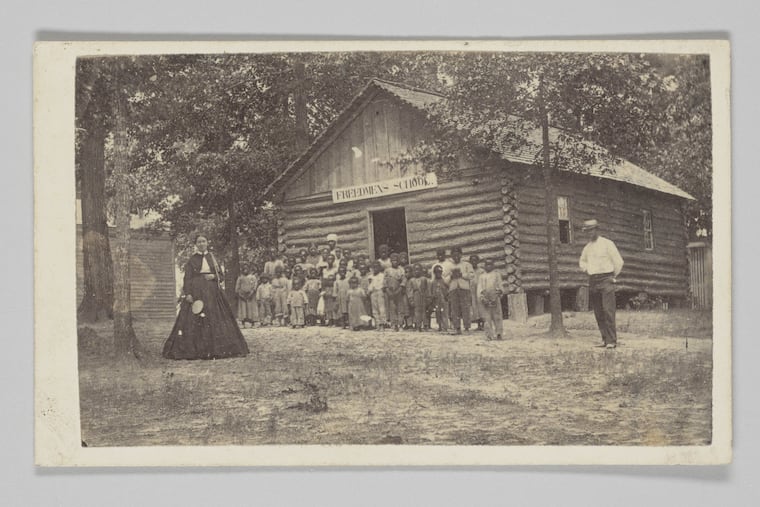MLK Day ‘Transcribe-A-Thon’ at AAMP is seeking volunteers to help the Smithsonian put the Freedmen’s Bureau back on the map
The event will introduce participants to the Smithsonian effort to digitize the records of the bureau, which W.E.B. Du Bois called an extraordinary "institution of social uplift."

One of Abraham Lincoln’s last acts as president was authorizing creation of the Freedmen’s Bureau, a government agency designed to assist nearly four million formerly enslaved people and many more rendered destitute in the South by the destructive arc of the Civil War.
Scholar and writer W.E.B. Du Bois called the bureau, created March 3, 1865, the “most extraordinary and far-reaching institution of social uplift that America has ever attempted.”
Indeed, nothing approached the scope and development ambition of the bureau until Franklin D. Roosevelt and the Great Depression.
Now, as part of its commemoration of Martin Luther King Jr. Day this year, the African American Museum in Philadelphia is putting the bureau’s enormous and invaluable documentary archival cache, much of which remains unseen and undigitized, at the heart of its effort to engage people in public service.
The museum, an affiliate of the Smithsonian Institution, is holding what it is calling a “Transcribe-A-Thon” that began Saturday and will continue Sunday and Monday mornings. Volunteers will transcribe the Freedmen’s Bureau Records held by the National Museum of African American History and Culture, helping to make them searchable, digitized resources accessible to all.
The effort is part of an enormous project the Smithsonian and the National Archives undertook several years ago to render a critical part of the nation’s history visible. Not only are the documents voluminous, but they cut to the heart of the nation’s identity and the obfuscation of Black history through earlier and ongoing neglect.
Underfunded and understaffed (the Freedmen’s Bureau didn’t even have its own separate budget when it launched), the bureau nevertheless built colleges and schools, provided food and medical care, served as arbitrator in labor negotiations and disputes, presided over the legalization of marriages, located missing family members, helped Black vets, and even set up a court system in war-ravaged Southern regions.
In other words, the Freedmen’s Bureau records touch on virtually every aspect of the family histories of millions and illuminate the most neglected and ignored parts of the nation’s story.
“I think a lot of folks don’t know what the Freedmen’s Bureau was,” said Ivan Henderson, AAMP’s executive vice president of programs. The transcription project works to fill in the gap.
“There’s the obvious value of continuing to not only learn about history but, as we’re understanding, to tell the truth about it and to paint as complete a picture as possible,” he said.
Hannah Wallace, AAMP’s manager of educational programming, came up with the idea, no easy task given that all the museum’s MLK Day activities this year, including the public service aspect, are virtual. (Citizen’s Bank provided $30,000 to subsidize the events, all of which are free.)
Wallace discovered the Smithsonian’s long-running transcription project.
“We will be using the primary documents from the National Museum of African American History and Culture, which they have on their website,” Wallace said. Reconstruction is the time of King’s grandparents, she thought, and the Freedmen’s Bureau transcription effort would be a way to help bring that world into the light.
“What were they doing to secure a world that Dr. King, then, would push forward in his own lifetime?” she said. “I was just tying history directly into it and making sure that we see the full view.”
Connections and parallels
Creating an environment where it becomes possible to see historical connections and parallels is a major goal of the museum’s MLK Weekend projects. For instance, each day begins with a dramatic reading of an iconic speech by King, performed by Theatre in the X.
“In light of recent events, what we’re thinking about is this dichotomy of justice, you know, that we’re facing, and whose justice are we fighting for, whose nation are we fighting for? Because it’s all caught in the same timeline, it doesn’t feel as though it’s that far away,” Wallace said.
A conversation with Philadelphia poet laureate Trapeta Mayson and writer Jonathan Escoffery, moderated by writer Leesa Fenderson, is one of Sunday’s highlights.
And on Monday, at 3:30 p.m., Nicole Fleetwood, writer, curator, and professor of American studies and art history at Rutgers University, will discuss the centrality of African American visual artists and collectives to Black freedom struggles throughout the 20th and 21st centuries. Her presentation will be followed by a dialogue with select artists from the museum’s “Rendering Justice” exhibition.
“I think one of the things that we do at the museum and I’m hoping to accomplish through this program is allowing our audiences to have the right, the privilege, the autonomy to kind of humanize each other,” said James Claiborne, AAMP manager of public programming. “I think that there is power in stopping and acknowledging the human story.”
For a complete schedule of MLK Weekend programs, including film screenings, talks, and conversations, visit the museum’s website, aampmuseum.org.